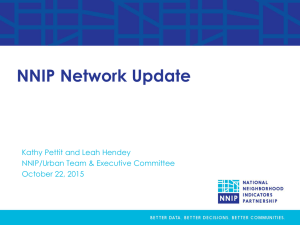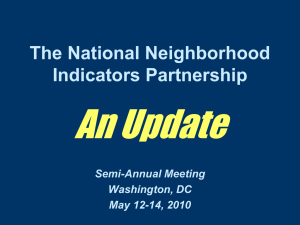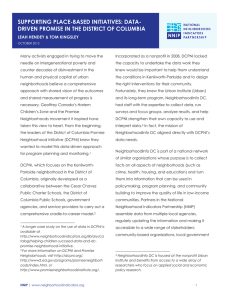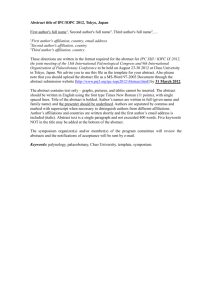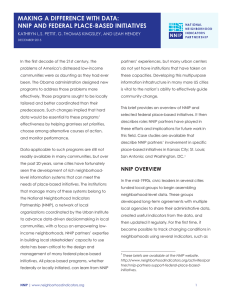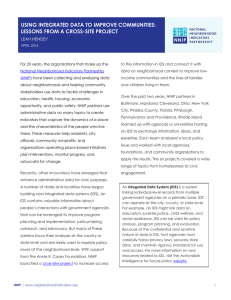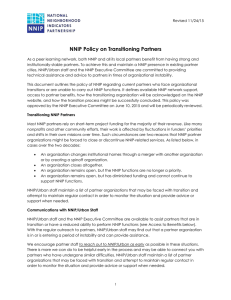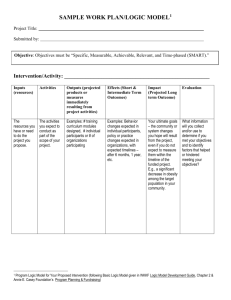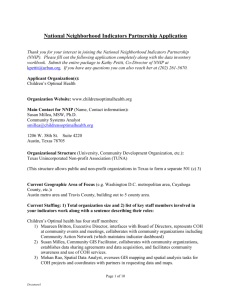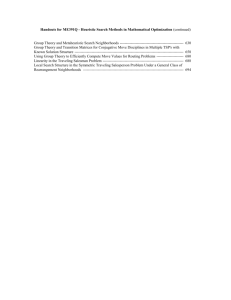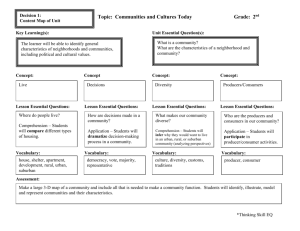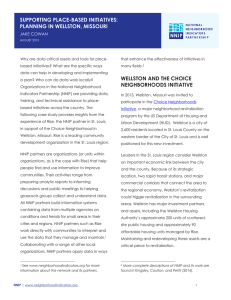FileNewTemplate - National Neighborhood Indicators Partnership
advertisement
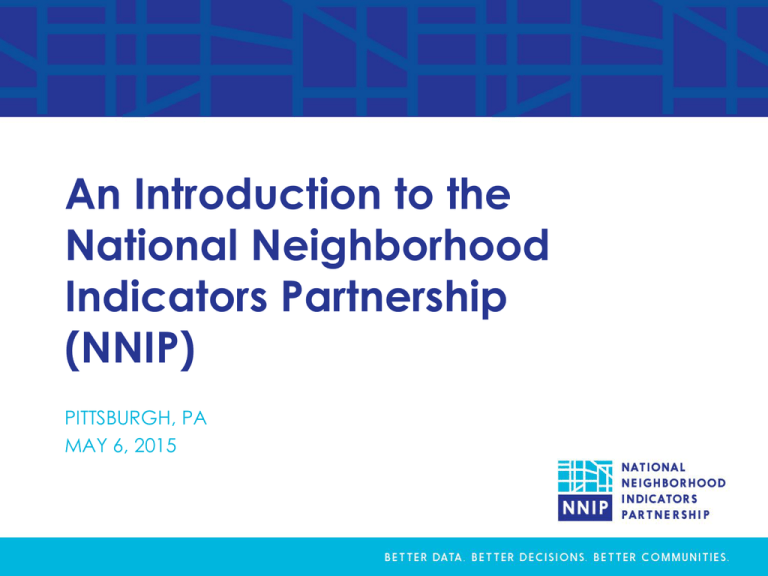
An Introduction to the National Neighborhood Indicators Partnership (NNIP) PITTSBURGH, PA MAY 6, 2015 National Neighborhood Indicators Partnership (NNIP) • Collaborative effort between the Urban Institute & local partners in 34 cities • NNIP partners help residents and institutions use data to improve neighborhoods in advocacy, planning, and policymaking. NNIP History • 1980s/1990s: local organizations funded by Jim Gibson through Rockefeller Foundation begin to use data in community organizing • June 1995 – First meeting of Urban and first six local intermediaries to discuss partnership – Atlanta, Boston, Cleveland, Denver, Oakland, Providence • June 1996: Urban assessment completed, report published, partnership funded Better Data. Better Decisions. Better Communities. Success Factors • Trusted and engaged institutions • Relevant and high-quality data • Mission to support use of data for action Trusted and Connected Institutions Number of NNIP Partners by Institutional Type, May 2015 12 10 10 8 8 7 6 5 4 3 2 1 0 Nonprofit-broad mission University Partnerships Funder Local Govt. Agency Nonprofit-info only Relevant and High Quality Data REGION CITY NEIGHBORHOOD PARCEL TRACTS Types of Data Education Child care Births, deaths TANF, Food Stamps Health Crime Property sales, prices Foreclosures Mission: Data for Local Action • Democratize Information – Facilitate the direct use of data by stakeholders • Serve multiple audiences and purposes – But a central focus on strengthening and empowering low-income neighborhoods • Use information to promote collaboration – Acts as a bridge among public agencies, nonprofits, businesses, resident groups Interpreting, Communicating, and Engaging with Data: Example from Austin COH Approach to Presenting Data • Use multiple sources to understand the problem and potential solutions. • Include community needs and assets. • Admit imperfections and limitations. • Enlist participants to fill out the picture (including tangible and intangible). Understanding the Problem COH Community Summit Operational & Policy Changes • Targeted allocation of resources by City and County to neighborhoods of highest need • City planning added sidewalks and hike/bike trails in neighborhoods with greatest need • AISD School Board includes student health as a core value • Improved physical education and health curriculum in schools • Improved awareness and advocacy around importance of school recess The NNIP Network Obligations: Doing the Work at Home • Building and operating information systems with integrated and recurrently updated data on neighborhood conditions • Facilitating and promoting the direct practical use of data by community and city leaders for community building and local policy making • Emphasizing the use of information to build the capacities of institutions and residents in distressed neighborhoods Obligations to the NNIP Partnership • Add publications and activities to the NNIP website • Data holdings, analysis, dissemination • Participate actively in work of the Partnership • Best efforts to attend all meetings, conferences, workshops • Make presentations to partners, participate in peer learning • Participate in network planning for specific issues • Update Urban staff via phone on local work twice per year • Promote NNIP principles • Note and promote affiliation with NNIP and its principles in local work and professional activities NNIP Leadership Management and Development 2015 Executive Committee Executive Committee Duties • Mark Abraham, New Haven • Plan partnership activities • Bob Gradeck, Pittsburgh • Monitor performance of activities • Jeff Matson, Minneapolis • Sheila Martin, Portland • Eleanor Tutt, St. Louis • Max Weselcouch, New York • Review/determine policies of the partnership Joint Work Program– NNIP Partnership • Advance the state of practice – Informing local policy initiatives – Developing tools and guides • Build/strengthen local capacity – Developing capacity in new communities – Services to an expanding network • Influence national context/partnering – Leadership in building the field NNIP Cross-site Projects Topic Years Funder John D. and Catherine T. MacArthur Foundation Civic Data & Tech 2015-17 Integrated Data Systems 2013-15 Annie E. Casey Foundation NNIP and Open Data 2012-14 John D. and Catherine T. MacArthur Foundation Kids and Foreclosure 2009-12 Open Society Foundation Annie E. Casey Foundation School Readiness 2007-10 Annie E. Casey Foundation Foreclosure Crisis 2008-09 Fannie Mae Guiding Land Markets 2004-08 Brookings Institution Reentry Mapping Network 2001-04 Annie E. Casey Foundation National Institute of Justice Older: Neighborhoods and Health, Welfare-to-Work Current Network Funding • Annie E. Casey Foundation – General Support/Meeting Costs – Cross-site project on Integrated Data Systems • John D. and Catherine T. MacArthur Foundation – General Support/Meeting Costs – New project on civic data/tech Connect at www.NeighborhoodIndicators.org or @NNIPHQ Kathy Pettit: kpettit@urban.org; 202-261-5670 Leah Hendey: lhendey@urban.org; 202-261-5856
